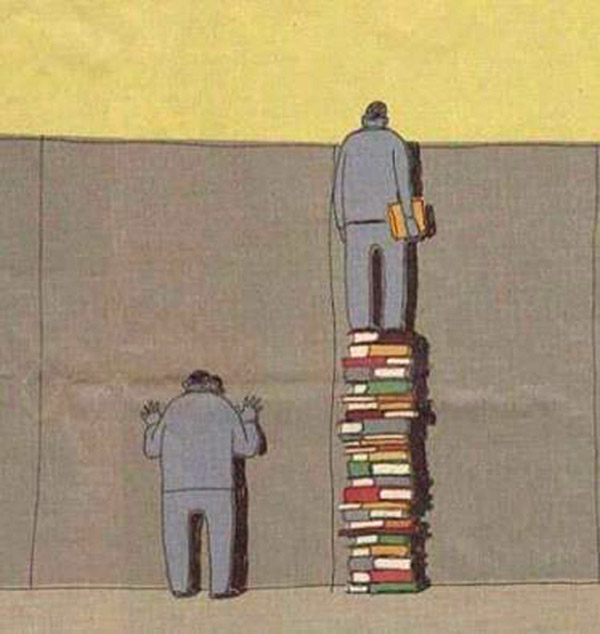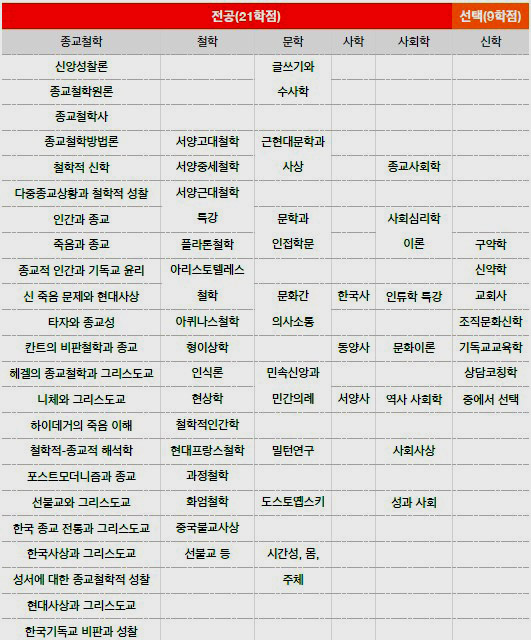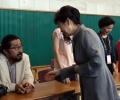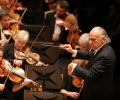
페친 김영민 사진
신학도와 인문학
연세대학교 대학원 신학과와 연합신학대학원이 한국 개신교 신도 감소와 사회적 비판 등 많은 문제가 대두되고 있는 점을 고려하여 <종교철학> 전공(아마도 석사와 박사 과정)을 신설하여 2014학년도 2학기부터 신입생을 선발하기로 했단다. "신학이 교회 밖과 소통해야 한다"는 동기였다고 한다.<에큐메니안>(2014.4.23. 보도).
대다수의 한국교회 목사후보생들은 인문학 공부를 충분히 하지 않은 채로 신학을 공부한다. 일면 안타까운 부분이다. 신학교(신학대학원, 신학전문대학원)이 대학과정 교육 이수자를 입학시키는 까닭이 있다. 복음전도, 진리변증, 말씀선포를 성공적으로 하려면 철학과 인문학의 기본 그리고 글쓰기(비평적 사고) 능력을 갖추어야 하기 때문이다. 신학도와 전도자에게 인문학 수업은 선택이 아니라 필수이다.
연세대가 개설할 과목들을 보니 부러움이 생긴다. 그러나 과연 설정한 목표에 도달할 수 있을지 의문스럽다. 자유주의 신학을 기본 패러다임으로 가진 교수들로부터 배우는 인문지식은 교회의 생명력 상실에 이바지해 왔을 뿐이다. 도움을 주지 않았다.
유럽, 북미, 대양주의 주류 교회들이 침몰한 까닭을 생각해 보라. 히틀러를 추종하던 당대 독일의 저명한 신학자, 철학자, 지성인, 신학교수, 목사들... 그들에게 인문적 소양이 부족했던가? 인문지식은 살인자를 추앙하고 교회로 하여금 우상숭배를 하도록 도왔다. 동경제국대학교 철학과 출신 채필근 목사(교회사敎悔師 양성소인 평양신학교 교장)의 경우를 보라.
위 교과목이 한국교회의 퇴락을 막는데 일조하려면, 길은 있어 보인다. 바울처럼 배운 것들을 배설물로 여기고 역사적 기독교와 신학충돌을 일으키는 자유주의 신학 또는 현대주의 사고의 패러다임을 버리는 것이다. 현실적으로 불가능해 보이지만, 가르치는 자들이 진정 하나님의 특별계시인 성경으로 돌아가고 성령으로 거듭난 사람들이고, 배우는 사람들도 그러한 경우에만, 새 과정을 신설하는 학교가 설정한 목표에 도달할 수 있을 수 있을 것이다.

연세대 종교철학 전공 (석사 박사과정 커리큐럼)
목사후보생에게 신학교에 입학하기 전에 서양철학사를 포함한 인문학을 가능한 많이 공부하라고 권하고 싶다. 고등학교 졸업자와 대학과정 졸업자를 위한 2년 과정 정도의 신학예비-인문학 교육, 비평적 사고능력 훈련, 글쓰기(비평적 사고) 훈련 과정을 만들어 봄직하다.
철학사는 인간 이성의 오류의 역사(history of philosophy is the history of errors of human reasons)이다. 철학 사 중심의 인문학은 영원히 변치 않는 진리를 탐색하고 가르치고 전하는 전도자에 꼭 필요한 도구를 제공한다. 하나님은 가말리엘 문하에서 학문방법을 잘 배운 바울을 사용하셨다. 바울이 배설물로 여긴 것은 그가 배운 헬라철학의 내용이지 학문 방법 또는 도구가 아니었다.
목사는 기본적으로 학자여야 한다. 한 손에 성경을 들고 다른 한 손에 신문을 들고 강단에 선 학자이다. 인문학 기반 없이 성경 관점으로 신문을 읽고 해석하기 어렵다. 인문학의 초보는 비평적 사고 훈련이다. 사유하는 힘을 가진 목사가 성경을 바르게 가르칠 수 있다. 아래에 게시한 "사유하는 힘을 가진 그대 '생각박사'"를 읽어보라.
대학과정에서 인문학만 배우면 노벨상 받을 가능성이 그렇지 않은 학생보다 클 수 있다. 대학과정에서 고전 100권의 핵심을 파악하고 그 내용을 타인에게 요점적으로 10분, 20분, 30분 동안 들려 줄 수 있는 실력을 갖추고 신학대학원에 입학한 사람이면 틀림 없이 '명설교자'라고 평가받을 것이다.
대학 4년 과정 동안 고전 100권을 읽게 하는 인문학 교육으로 유명한 대학이 있다. 아래와 같다.
St. John's College, Maryland, USA
Reading list[edit]
Although it varies from year to year and differs slightly between campuses, the Great Books reading list is the basis of the school's curriculum. The 2013-2014 list is as follows:
Freshman year[edit]
- Homer: Iliad, Odyssey
- Aeschylus: Agamemnon, Libation Bearers, The Eumenides, Prometheus Bound
- Sophocles: Oedipus Rex, Oedipus at Colonus, Antigone, Philoctetes Ajax
- Thucydides: Peloponnesian War
- Euripides: Hippolytus, The Bacchae
- Herodotus: Histories
- Aristophanes: Clouds
- Plato: Meno, Gorgias, Republic, Apology, Crito, Phaedo, Symposium, Parmenides, Theaetetus, Sophist, Timaeus, Phaedrus
- Aristotle: Poetics, Physics, Metaphysics, Nicomachean Ethics, On Generation and Corruption, Politics, Parts of Animals, Generation of Animals
- Euclid: Elements
- Plutarch: "Lycurgus" and "Solon" from the Parallel Lives
- Antoine Lavoisier: Elements of Chemistry
- William Harvey: Motion of the Heart and Blood
- Essays by: Archimedes, Gabriel Fahrenheit, Amedeo Avogadro, Joseph Black, John Dalton, Stanislao Cannizzaro, Rudolf Virchow, Edme Mariotte, Hans Adolf Eduard Driesch, Joseph Louis Gay-Lussac, Hans Spemann, Guy Beckley Stearns, J. J. Thomson, Dmitri Mendeleev, Claude Louis Berthollet, Joseph Proust
Sophomore year[edit]
- The Bible
- Aristotle: De Anima, On Interpretation, Prior Analytics, Categories
- Apollonius: Conics
- Virgil: Aeneid
- Plutarch: "Caesar", "Cato the Younger", "Antony", and "Brutus" from the Parallel Lives
- Epictetus: Discourses, Manual
- Tacitus: Annals
- Ptolemy: Almagest
- Plotinus: The Enneads
- Lucretius: On the Nature of Things
- Augustine of Hippo: Confessions
- Maimonides: Guide for the Perplexed
- Anselm of Canterbury: Proslogium
- Thomas Aquinas: Summa Theologica
- Dante: Divine Comedy
- Geoffrey Chaucer: Canterbury Tales
- Niccolò Machiavelli: The Prince, Discourses
- Johannes Kepler: Epitome IV
- François Rabelais: Gargantua and Pantagruel
- Giovanni Pierluigi da Palestrina: Missa Papae Marcelli
- Michel de Montaigne: Essays
- François Viète: Introduction to the Analytical Art
- Francis Bacon: Novum Organum
- William Shakespeare: Richard II, Henry IV, Part 1, Henry IV, Part 2, The Tempest, As You Like It, Hamlet, Othello, Macbeth, King Lear, Sonnets
- Poems by: Andrew Marvell, John Donne, and other 16th- and 17th-century poets
- René Descartes: Geometry, Discourse on Method
- Blaise Pascal: Generation of Conic Sections
- Johann Sebastian Bach: St. Matthew Passion, Inventions
- Joseph Haydn: Quartets
- Wolfgang Amadeus Mozart: Operas
- Ludwig van Beethoven: Third Symphony
- Franz Schubert: Songs
- Claudio Monteverdi: L'Orfeo
- Igor Stravinsky: Symphony of Psalms
Junior year[edit]
- Miguel de Cervantes: Don Quixote
- Galileo Galilei: Two New Sciences
- Thomas Hobbes: Leviathan
- René Descartes: Meditations, Rules for the Direction of the Mind
- John Milton: Paradise Lost
- François de La Rochefoucauld: Maximes
- Jean de La Fontaine: Fables
- Blaise Pascal: Pensées
- Christiaan Huygens: Treatise on Light, On the Movement of Bodies by Impact
- George Eliot: Middlemarch
- Baruch Spinoza: Theologico-Political Treatise
- John Locke: Second Treatise of Government
- Jean Racine: Phèdre
- Isaac Newton: Principia Mathematica
- Johannes Kepler: Epitome IV
- Gottfried Leibniz: Monadology, Discourse on Metaphysics, Essay on Dynamics, Philosophical Essays, Principles of Nature and Grace
- Jonathan Swift: Gulliver's Travels
- David Hume: A Treatise of Human Nature
- Jean-Jacques Rousseau: Social Contract, The Origin of Inequality
- Molière: Le Misanthrope
- Adam Smith: Wealth of Nations
- Immanuel Kant: Critique of Pure Reason, Foundations of the Metaphysics of Morals
- Wolfgang Amadeus Mozart: Don Giovanni
- Jane Austen: Pride and Prejudice
- Richard Dedekind: Essay on the Theory of Numbers
- The Declaration of Independence
- Articles of Confederation
- The Constitution of the United States of America
- The Federalist Papers
- Mark Twain: Adventures of Huckleberry Finn
- William Wordsworth: The Two-Part Prelude of 1799
- Essays by: Thomas Young, Brook Taylor, Leonhard Euler, Daniel Bernoulli, Hans Christian Ørsted, Michael Faraday, James Clerk Maxwell
Senior year[edit]
- Supreme Court opinions
- Johann Wolfgang von Goethe: Faust
- Charles Darwin: The Origin of Species
- Georg Wilhelm Friedrich Hegel: Phenomenology of Spirit, "Logic" (from the Encyclopedia)
- Nikolai Ivanovich Lobachevsky: Theory of Parallels
- Alexis de Tocqueville: Democracy in America
- Abraham Lincoln: Selected Speeches
- Søren Kierkegaard: Philosophical Fragments, Fear and Trembling
- Richard Wagner: Tristan und Isolde
- Karl Marx: Capital, Political and Economic Manuscripts of 1844, The German Ideology
- Fyodor Dostoevsky: The Brothers Karamazov
- Leo Tolstoy: War and Peace
- Herman Melville: Benito Cereno
- Mark Twain: The Adventures of Huckleberry Finn
- Flannery O'Connor: Selected Stories
- Sigmund Freud: Introductory Lectures on Psychoanalysis
- Booker T. Washington: Selected Writings
- W. E. B. Du Bois: The Souls of Black Folk
- Edmund Husserl: Crisis of the European Sciences
- Martin Heidegger: Basic Writings
- Albert Einstein: Selected Papers
- Joseph Conrad: Heart of Darkness
- William Faulkner: Go Down Moses
- Gustave Flaubert: Un Coeur Simple
- Virginia Woolf: Mrs. Dalloway
- Poems by: W. B. Yeats, T. S. Eliot, Wallace Stevens, Paul Valéry, Arthur Rimbaud
- Essays by: Michael Faraday, J. J. Thomson, Hermann Minkowski, Ernest Rutherford, Clinton Davisson, Erwin Schrödinger, Niels Bohr, James Clerk Maxwell, Louis-Victor de Broglie, Werner Heisenberg, Gregor Mendel, Theodor Boveri, Walter Sutton, Thomas Hunt Morgan, George Wells Beadle & Edward Lawrie Tatum, Gerald Jay Sussman, James D. Watson & Francis Crick, François Jacob & Jacques Monod, G. H. Hardy


 중국어, 매혹 덩어리
중국어, 매혹 덩어리
 그리 아니하실지라도
그리 아니하실지라도















진리를 위한 도구로서, 지성을 위해 책읽기를 지속해야 할 줄 생각합니다.구약의 모세, 신약의 바울이 됨은 준비(믿음과 지성)된 사람이었다는 것... 신학과정에도 인문분야 독서량도 채택되면 좋겠습니다.